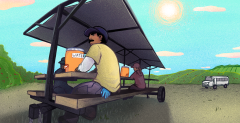Oscar Chacón is a co-founder and executive director of Alianza Americas. He tells us his story:
I led a delegation to northern Honduras in August and introduced them to a journalist who matter-of-factly recalled beatings at the hands of police while reporting on a peaceful protest. Other community leaders we met recalled relatives who had disappeared or been jailed after clashing with powerful mining companies or protesting a dam that would destroy their ancestral lands.
After decades of working in Honduras, I know this is the cost activists and journalists face for disagreeing with the Honduran government. Even international recognition does not deter the violence. Land defender Berta Cáceres, who won the prestigious Goldman Environmental Prize, was murdered in March 2016. Sadly, she was neither the first nor the last casualty.
The United Nations reported this February that 128 environmental defenders have been murdered in Honduras since 2010, and that this country has one of the highest rates of femicide in the world. The fact that only 2-5% of cases are ever successfully brought to justice, and high-ranking police officers have alleged ties to organized crime makes it hard for anyone to believe in the system.
Being a 'public charge' is serious: The left is abandoning consensus that immigrants are not entitled to public welfare
Over and over again, during our visits, I heard similar accounts of persecution and violence at the hands of the government. Then, last month, I was horrified to hear the Trump administration announce a new migration cooperation agreement with Honduras that would force asylum-seekers to seek protection there.
Honduras can't protect its own citizens
The United States is negotiating with a government led by Juan Orlando Hernández, who was just implicated directly by known drug trafficker Alexander Ardon in a New York court for allegedly discussing the use of drug money in his election campaigns. It is absurd to think that Honduras can protect people fleeing violence elsewhere in Central America when it cannot guarantee the safety of its own citizens, is run by a corrupt government, and seems to see peaceful protest as an opportunity for repression.
Instead of cooperating to protect people and provide opportunity, the new agreement will just trap people in Honduras who were desperately seeking safety in the United States.
Tragically, the U.S. government has a long history of making matters worse rather than helping the people of Central America.
The long history of failed U.S. foreign policy in Honduras goes back more than a hundred years, across both parties, from military interventions in 1907 and 1911 to protect U.S. interests, to U.S. corporations that shamelessly bribed and extorted control over much of the agricultural lands, to support for military repression during the Cold War. The U.S. government continued to undermine Honduran democracy when it accepted both the coup d’etat in 2009, during the Obama administration and, most recently, the fraudulent 2017 election that put the current Honduran president into power.
Migrants want to stay in their homes
Delegations like ours are necessary in order to inform effective policies that acknowledge the consequences of U.S. involvement, which has left Honduras in shambles. I took Massachusetts state legislators, journalists and local leaders to northern Honduras and to the cities of El Progreso and San Pedro Sula so they could hear from communities about how the government continues to abuse its power and trump up charges against activists, simply for exercising their freedom of speech or right to peacefully protest.
Women, children are worth more than this: Detained migrants still have a right to proper medical care
While there is no simple solution to fix our immigration system, we must start with making sure U.S. aid does not support the state-sponsored violence in Central America and instead strengthens democracy. The United States has an undeniable presence, through both the military aid backing the Honduran government's brutal attacks, and through U.S. weapons, as political violence by Honduran military police officers is committed with U.S.-made M4 rifles.
The community groups our delegation met with in August stressed the urgent need for funding to protect women’s rights and safety, the need to monitor U.S. corporate development projects in the region and the need for investments in job creation.
While we continue to push for structural change, the U.S. government must immediately end its attack on Central Americans and other migrants seeking safety at our borders. This visit to Honduras, while shocking some on our delegation, served to reinforce what I’ve known for a while now: People want to stay in their homes and thrive there.
Across all of Central America, not just Honduras, it is time we address the factors forcing migration and provide people with the proper opportunities to safely prosper within their countries.

